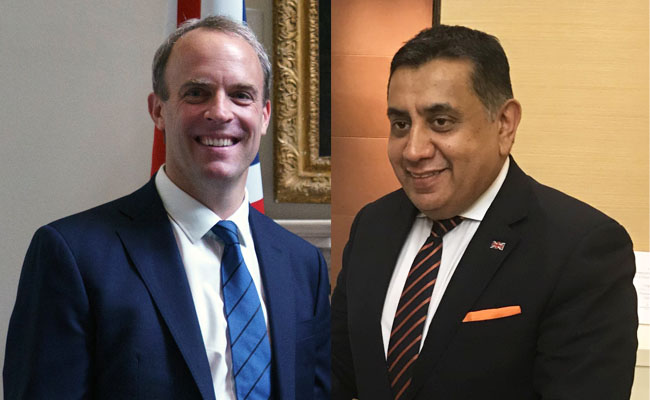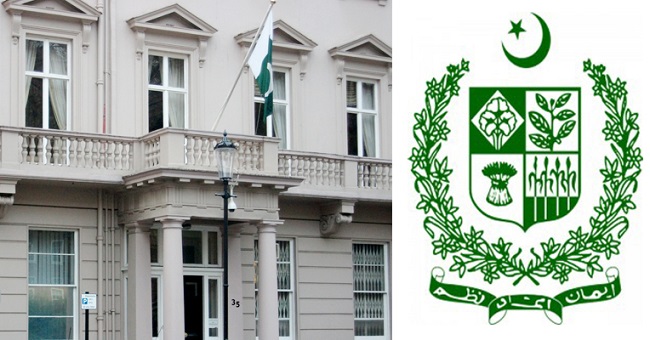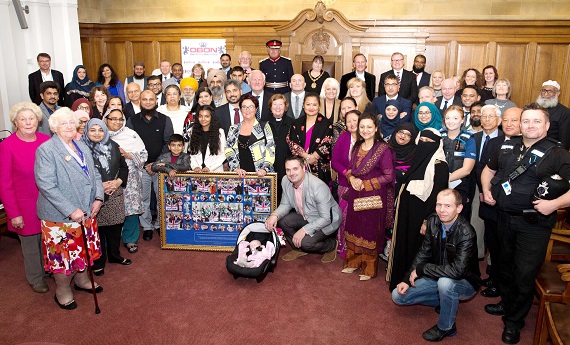UK Human Rights and Democracy 2020

London: This report assesses the situation in 30 countries, which the Foreign & Commonwealth Office (FCO) has designated as its human rights priority countries. These are Afghanistan, Bahrain, Bangladesh, Burma, Burundi, Central African Republic, China, Colombia, Democratic People’s Republic of Korea, Democratic Republic of the Congo, Egypt, Eritrea, Iran, Iraq, Israel and the Occupied Palestinian Territories, Libya, Maldives, Pakistan, Russia, Saudi Arabia, Somalia, South Sudan, Sri Lanka, Sudan, Syria, Turkmenistan, Uzbekistan, Venezuela, Yemen, and Zimbabwe.
Almost 75 years ago, the UN charter established the three pillars of the UN’s work: maintaining international peace and security; promoting and protecting human rights; and fostering development. As we mark the UN’s 75th anniversary, the UK’s commitment to these three pillars remains steadfast. This report details the UK’s partnerships with human rights defenders, our leadership on promoting media freedom and gender equality, our work to eradicate modern slavery, and our commitment to deliver change for those who are abused, targeted, or killed for their religion or beliefs.
[Weasel words as the UK continues to deport people to all the countries mentioned]Afghanistan
There remain fundamental challenges to the protection of human rights in Afghanistan. Legal provisions and government commitments to protect human rights exist, but implementation and further progress is constrained by: ongoing conflict, lack of institutional capacity, Taliban control over large parts of the country, and societal conservatism. Afghanistan endures as the most lethal ongoing conflict in the world, with more civilian casualties than any other country.
Bangladesh
There was no improvement in the overall human rights situation in Bangladesh in 2019. The ruling Awami League and its allies returned to power in December 2018, winning 96% of parliamentary seats. The elections were marred by reports of intimidation and vote rigging. In January, the EU called on the authorities to ensure a proper examination of allegations of election irregularities. Reports of extrajudicial killings, enforced disappearances, and attacks on journalists and others continued during the year. The number of death sentences issued increased, and at least two executions were carried out. Throughout the year, UK ministers met opposition politicians, media representatives, and indigenous leaders, and in April the then Minister for Asia, Mark Field, raised human rights concerns with Prime Minister Sheikh Hasina.
Burundi
The main human rights violations in Burundi in 2019 concerned enforced disappearances and extra-judicial killings, sexual violence, and restrictions on media freedom, democratic space, and freedom of expression. Members of the ruling party’s youth league, the Imbonerakure, were identified by international observers, including the UN and NGOs, as being the main perpetrators of violations and abuses. The Burundian National Intelligence Service (SNR) and the police also frequently perpetrated human rights violations.
China
The human rights situation in China has continued to deteriorate significantly and consistently since 2018. China continued to place restrictions on expression of religious belief, ethnic minorities, the media and wider freedom of expression, as well as detaining and harassing human rights defenders, and restricting the space for civil society to operate. The authorities’ use of arbitrary detention continued, as did a lack of judicial transparency and due process, particularly in cases deemed ‘politically sensitive’.
Colombia
In 2019, the protection of human rights in Colombia was hampered by the country’s continued struggle to ensure peace, three years after the government signed an historic agreement with the Revolutionary Armed Forces of Colombia (FARC). The situation of the country’s human rights defenders (HRDs) remained a particular concern, and despite minor improvements in the conviction rate, the level of violence against HRDs continued to be worryingly high.
Democratic People’s Republic of Korea
There was no improvement in the dire human rights situation in the Democratic People’s Republic of Korea (DPRK) in 2019. The regime continued to exert control over nearly every aspect of citizens’ lives: they were told what to believe, what to consume, and where they could travel. Those who defied the state could face imprisonment or even death.
Democratic Republic of Congo
The UN Joint Human Rights Office (UNJHRO), which monitors human rights violations in DRC, reported a worsening of the human rights situation in conflict affected areas in 2019. Human rights violations and abuses included sexual and gender based violence (SGBV), arbitrary arrest and detention, and extrajudicial killings. UNJHRO reported that the number of abuses attributed to members of armed groups and militias had increased; whilst those committed by state agents had reduced. However, state agents remained the main perpetrators, committing 54% of documented violations.
Egypt
The general trajectory of human rights in Egypt continued to decline in 2019, though there was some progress in certain areas. Space for freedom of expression and civil society continued to shrink. Media freedom and political opposition came under particular pressure: protests and attempts to organise politically resulted in the arrest and detention of activists, lawyers, journalists, and human rights defenders (HRDs), often on charges of terrorism or spreading false news. There was some progress on freedom of religion or belief (FoRB) and gender equality.
Iran
Iran continued to violate human rights during 2019, carrying out the most deadly crackdown against internal unrest since the 1979 revolution. The UK’s main concerns were: the continued lack of fair trials; restricted access to legal representation, and due legal process, including for dual nationals (Chapter Three: Consular Assistance gives more detail); the widespread use of the death penalty; violations of the right to freedom of expression and to freedom of religion or belief; and the limitations on the right of women to participate fully in society.
Iraq
The human rights situation in Iraq deteriorated sharply in 2019, particularly in the last quarter of the year. Systematic repression of popular demonstrations resulted in large-scale loss of life and casualties, detentions, and restrictions on the media and on access to information. Women and members of minorities remained marginalised, including from decision- making. The continued use of the death penalty, and forced returns of internally displaced persons (IDPs), remained concerns. Overall, the implementation of human rights protections and accountability remained weak.
Israel and the Occupied Palestinian Territories
2019 saw continued violations by the Government of Israel (GoI) of human rights and international humanitarian law in the context of Israel’s occupation of the West Bank, including East Jerusalem, and Gaza (Occupied Palestinian Territories, or OPTs). Human rights abuses by the Palestinian Authority (PA), and by Hamas, the de facto administration in Gaza, continued. The humanitarian crisis in Gaza was exacerbated by protests and escalations of violence between Israel and Palestinian armed groups. According to the Coordinator of Government Activities in the Territories (COGAT), a unit within the Israeli Ministry of Defence, 2,656 rockets and mortars, and 887 incendiary devices, were launched during 2019 into Israeli territory, causing 286 fires. In total, five Israeli civilians were killed. According to the UN Office for the Coordination of Humanitarian Affairs (OCHA), 107 Palestinians were killed, including 36 by live ammunition fired by Israeli forces.
Libya
In 2019, the human rights situation in Libya deteriorated further, as a result of the armed conflict which re-ignited in April. The situation was exacerbated by multiple breaches of the UN arms embargo. It was clear that Libya was enduring a proxy war, with a range of countries providing external military support to different sides. Reported human rights violations or abuses included: loss of life, including attacks on civilians and refugees; discrimination against women and girls; and limits to freedom of expression and of religion or belief. The UK worked to address these through a range of activities, supporting UN-led efforts towards a sustainable political settlement, and programme work addressing the most acute challenges.
Myanmar
2019 saw a deterioration in the human rights situation in some parts of the country. The situation as a whole remained poor. Human rights violations and abuses were committed by the Myanmar security forces and ethnic armed organisations (EAOs) across the country. There was no demonstrable progress on accountability for these violations and abuses. Of the 500,000 to 600,000 Rohingya remaining in Rakhine State, most continued to have their freedom of movement restricted and were confined to their homes with little access to markets and livelihoods. The Rohingya continued to fear for their security, lacking protection against vigilante attacks and theft of property.
Pakistan
There remained serious human rights concerns and violations in Pakistan in 2019, including restrictions on civic space and freedom of expression, intolerance, and direct and open discrimination towards some minorities. Concerns continued about the prevalence of bonded and child labour, and the failure to uphold the rights of women and children. The imposition and use of the death penalty continued. There was some progress on death penalty reform. The UK welcomed establishment of a Parliamentary Committee on Forced Conversions and the opening of the Kartarpur Corridor for Sikh pilgrims.
Russia
The human rights situation in Russia deteriorated further in 2019. Space for civil society reduced, as the government cracked down on dissent. However, Russian civil society showed increasing willingness to mobilise to challenge human rights violations. Democratic processes were increasingly controlled, and electoral filters prevented many opposition candidates from standing. In Moscow, the authorities prevented all genuine opposition candidates from standing in the September municipal elections, often on spurious grounds. This sparked a summer of protests, with one demonstration attracting 50,000 participants (the largest since 2012). In response, the authorities violently blocked protests and arrested around 2,500 of protesters. Ten protesters received lengthy prison sentences, despite the largely peaceful nature of the protests.
Somalia
Despite progress in recent years, Somalia remained a fragile, conflict- affected country. Al-Shabaab, the main terrorist and insurgent group in the country, continued to threaten the general population. Human development indicators were poor, governance was often weak, and many security forces and judicial institutions lacked training or capacity. 2019 was a challenging year for freedom of expression. Somali journalists faced a dangerous operating environment, including threats from Al-Shabaab and powerful private interests, as well as unfair treatment by local authorities. According to the main Somali journalist associations, arbitrary arrests, physical assaults, and intimidation of journalists continued to be rampant.
South Sudan
Grave human rights violations and abuses remained prevalent during 2019 despite reductions in armed conflict. Where fighting continued, UN reporting suggested that all parties to the conflict targeted and killed civilians, committed sexual violence, recruited children, and forcibly displaced communities with impunity. In addition, arbitrary restrictions on freedom of expression threatened to undermine the peace process. The top human rights concern remained conflict-related violations and abuses.
Sri Lanka
There was a deterioration in the overall human rights situation in Sri Lanka in 2019, with increased intercommunal tensions, violence against minority groups, and intimidation of human rights defenders. While Sri Lanka reaffirmed its commitment to post- conflict reconciliation and accountability through its co-sponsorship of UN Human Rights Council Resolution 40/1, delivery on this remained too slow. Controversial senior appointments called into question Sri Lanka’s commitment to human rights and reconciliation. Towards the end of 2019, there were reports of increased surveillance and intimidation of civil society groups and human rights defenders.
Syria
The human rights situation in Syria continued to be appalling in 2019. Arbitrary detention, enforced disappearances, torture, sexual violence, and severe restrictions on civil and political rights, including media freedoms, remained widespread. The Syrian regime was the main perpetrator of these violations, but abuses were also committed by proscribed terrorist organisations and by other armed groups. The UN Independent International Commission of Inquiry on the Syrian Arab Republic (COI) stated in September that “gender roles, and the inequalities that underpin them, have fuelled and amplified the impact of these violations.”
Turkmenistan
The human rights situation in Turkmenistan in 2019 remained a cause for concern. The principal issues were continuing allegations of torture and poor prison conditions, restrictions on freedom of expression and on freedom of religion or belief, gender discrimination, and restrictions on LGBT rights. There was little evidence of progress on the range of Universal Periodic Review (UPR) recommendations that Turkmenistan accepted in 2018, although Turkmenistan worked with the UN on a partnership agreement, which includes a rule of law and human rights element. Most human rights defenders still worked outside the country.
Venezuela
Throughout 2019, the Maduro regime used the Venezuelan state apparatus to coerce, repress, intimidate, detain, and torture, as reported by the UN Office of the High Commissioner for Human Rights (OHCHR). Maduro’s regime stripped 29 parliamentarians of their immunity without due process.The UN Working Group on Arbitrary Detention particularly highlighted the case of the MP, Juan Requesens, who continued to be detained arbitrarily after 16 months without trial.
Yemen
The human rights situation in Yemen remained dire, in the fifth year of the conflict. Despite some reductions in hostilities, conflict continued and caused widespread hardship for civilians. The UN Civilian Impact Monitoring Project recorded over 2,700 civilian casualties by the end of October, while The Armed Conflict Location and Event Data Project reported that over 100,000 people had been killed since 2014, including 12,000 civilians. The UN also reported widespread damage to infrastructure including hospitals, schools, and water systems. The International Organisation for Migration estimated that more than 3.6 million people have been forced to flee their homes since 2014, including 385,600 in 2019.
Zimbabwe
The human rights situation in Zimbabwe deteriorated in 2019. The human rights monitoring group, Zimbabwe Peace Project, recorded 2,761 human rights violations in the course of the year. This was more than a 10% increase on their figures for 2018. The majority of these violations were associated with the response by the security services to fuel protests in January. The crackdown and aftermath resulted in the deaths of 17 people, 17 reports of rape, 586 reports of assault, and 81 reported injuries by gunfire, violence for which no one has been held accountable. 2019 witnessed backsliding on political freedoms in Zimbabwe. Using legislation, the Zimbabwe Republic Police (ZRP) issued prohibition orders against demonstrations by the opposition and by some civil society and teachers’ groups. Where protests went ahead, the ZRP responded heavy- handedly, including with beatings.
Download the full report: https://is.gd/dLMJxa





